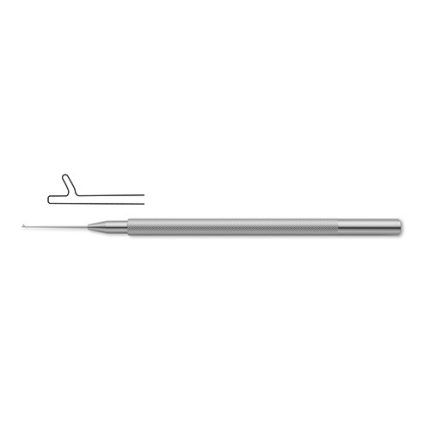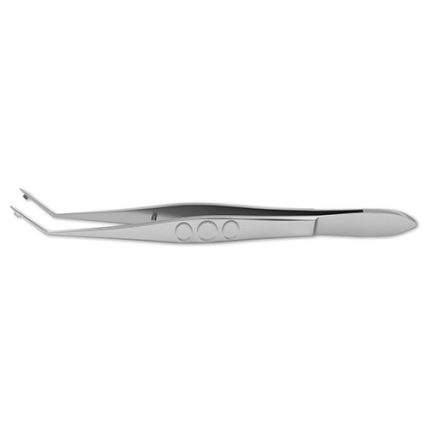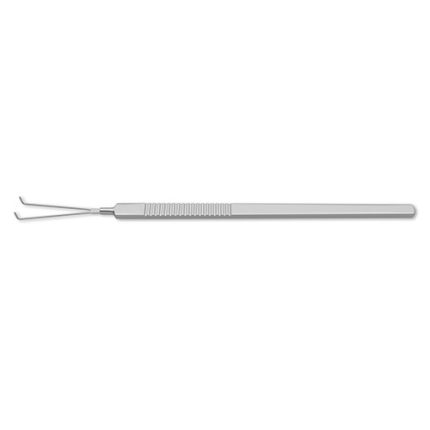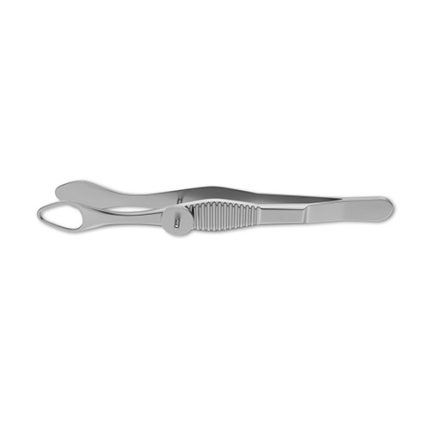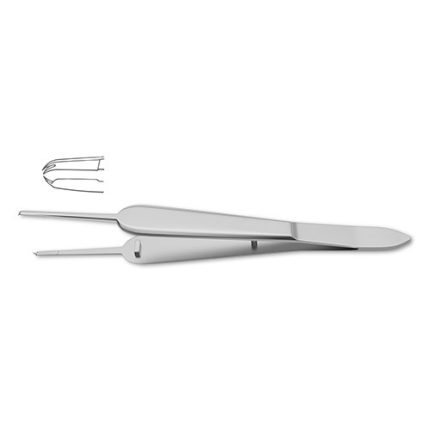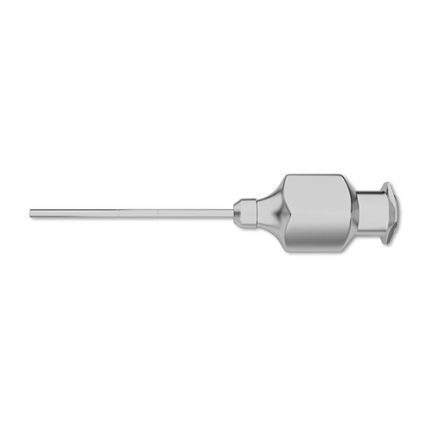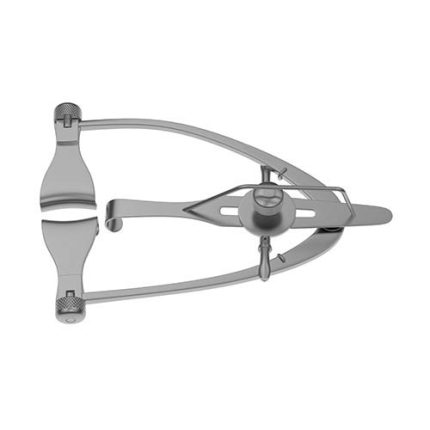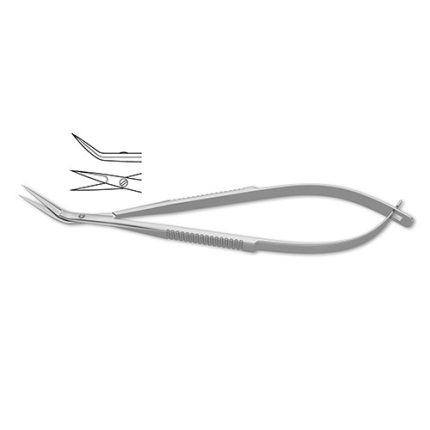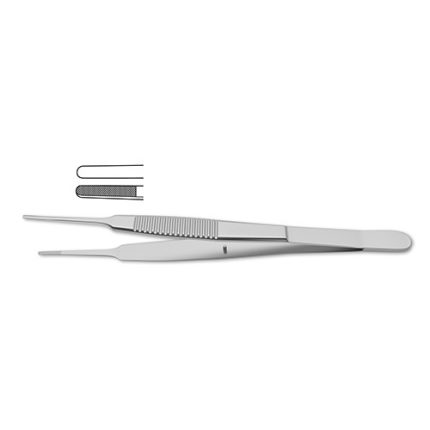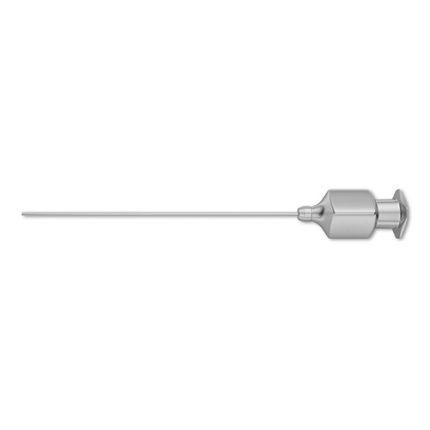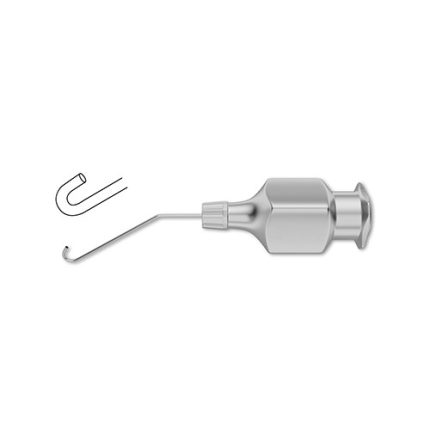Maltzman-Fenzl Lens Manipulating Hook
0.15 mm v-shaped tip, 4-3/4" (12.0 cm) Maltzman-Fenzl Lens Manipulating Hook is a commonly used tool during cataract procedures. The hook is used to manipulate the opacified native lens during a phacoemulsification procedure. The tip contains 2 prongs designed to cup the lens in a variety of positions. Both angled and straight models are available with the hook depending on surgical preference.
Manhattan Eye & Ear Suture Forceps
1x2 teeth, w/ platform, 3-1/2" (9.0 cm)Manhattan Eye and Ear Suture Forceps are a general purpose tool used in ophthalmologic and otologic operations. The wide angled teeth are useful in grasping the suturing needle and delicate eye and ear tissue during wound closure. The built in tying platform allows the surgeon the handle both tissue and sutures with the same instrument.
Manson Double-Ended Strabismus Hook
3.0 mm forked, angled blades, 7.0 mm blades spread, flat serrated handle, 4.8" (12.3 cm) Manson Double-Ended Strabismus Hook is a unique tool in ophthalmic operations involving the ocular muscles. The hook features 3.0 mm angled blades with a 7.0 mm spread for selective retraction and elevation of tendon insertions. In addition, the hook features a flat serrated handle for increased gripping power.
Masket Capsulorhexis Forceps
11.0 mm jaws Masket Capsulorhexis Forceps are a commonly used tool during cataract operations. The forceps are ideal for a posterior capsulorhexis, as the curved blades provided easier access to the posterior capsule. The jaws of the forceps are delicate enough to handle the posterior capsule tissue without tearing in an unwanted direction. Finger holes are provided on the handle of the forceps to adjust grip and traction during the procedure.
Maumenee Corneal Forceps
colibri type w/ 0.5 mm tying platform mounted on a pivot action handle, 0.10 mm teeth, 4-3/4" (12.0 cm) Maumenee Corneal Forceps are a multipurpose tool used in a variety of corneal procedures. The curved shaft with flat serrated cross-action handle is designed for firmly gripping the corneal tissue. The forceps are available angled both 45 and 90 degrees depending on surgical preference.
Maumenee Vitreous Aspirating Needle
blunt tip w/ markings, 5.0 mm, 10.0 mm & 15.0 mm, 18-gauge Maumenee Vitreous Aspirating Needle is a commonly used tool in retinal ophthalmologic procedures. The needle features a large gauge designed for the aspiration of the viscous vitreous fluid following retinal detachment or increased pressure. In addition, markings on the gauge aid the physician in navigation of the tool.
Maumenee-Park Speculum
blade spread 43.0 mm, 14.0 mm wide blades, 3-1/8" (7.9 cm) Maumenee-Park Speculum is a commonly used ophthalmologic tool when visualization of the entire globe is desired. Both end pieces of the blade can be fit into the upper and lower lid, achieving a spread of 43.0 mm. The speculum is self-retaining, designed to hold in place once a desired spread has been reached. Solid blades in the speculum ensure no tissue slippage into the surgical field. Both solid and fenestrated blades are available depending on physician preference.
McClure Iris Scissors
14.0 mm blades, angled on flat, 4-1/2" (11.4 cm) Castroviejo Corneal Section Scissors are a unique tool in performing a sclerocorneal section to gain access to the anterior chamber of the eye or lens during a cataract operation. The miniature pattern of the blades delivers maximum precision for delicate cuts of the corneal tissue. Both right and left curvatures are available on the scissors to accommodate a variety of surgical preferences.
McCullough Utility Forceps
3-3/4" (9.5 cm) Mccullough Utility Forceps are a general purpose tool used in many ophthalmologic surgeries. The forceps feature a flat serrated handle ideal for establishing a firm grasp of tissue in a variety of orientations. Finally, the forceps are available with smooth tips as well depending on surgical preference.
McIntyre Anterior Chamber Cannula
McIntyre Anterior Chamber Cannula is a frequently used tool in cataract IOL implantation procedures. Following nucleus fragmentation, the cannula may be used to aspirate any remaining debris from the anterior chamber. Both angled and straight tips are available in three different gauges depending on surgical preference.
McIntyre Lacrimal Probe Cannula
2" (5.0 cm), 23-gauge McIntyre Lacrimal Probe Cannula is an extremely useful tool in treating tear duct obstructions. The probe may be used to investigate blockage of lacrimal gland damage or more frequently, obstruction of the nasolacrimal duct. The slender profile of the cannula allows access to the small entrances of the duct. Both straight and curved models are available depending on surgical preference.
McIntyre-Binkhorst Irrigating Cannula
smooth blunt tip, front opening, 26-gauge McIntyre-Binkhorst Irrigating Cannula is a useful tool in cataract procedures. The curved tip of the cannula is used for loosing the peripheral cortex of the lens during difficult extraction. The cannula features a smaller gauge for easier access and a shorter working length for more control. Both right and left curvatures of the cannula are also available depending on surgical preference.

